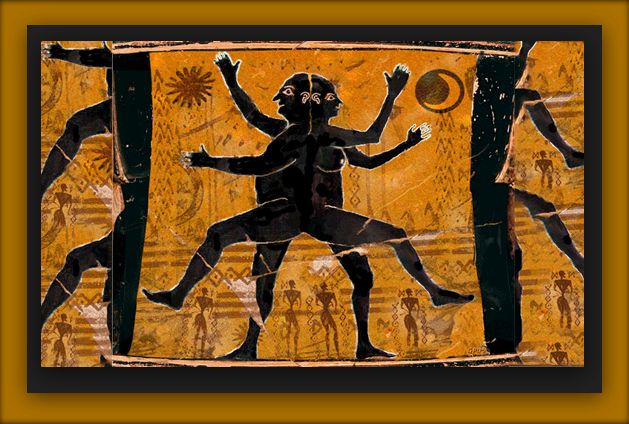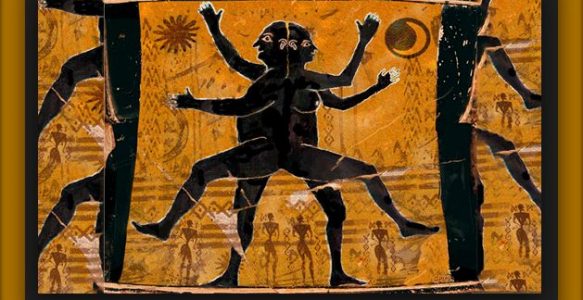Gracie Moore
The idea of soulmates is thought to have originated from Aristophanes’s speech in Plato’s Symposium. Aristophane argues that there were once three sexes, male, female, and androgynous, who were equally male and female (Plato 14). These beings were spherical, with four arms and legs, and very powerful. Due to the extent of their strength, they began to scheme to storm heaven and overthrow the gods. Zeus, hearing of this plan, proposed that all humans must be cut in half in order to weaken them without wiping out the human race altogether; thus each creature was cut in two, with androgynous beings becoming one male and one female, creating the humans we know today (Plato 15). Fundamentally, the human race is wounded, and each person is severed from their other half. As Plato writes, “when their nature was divided in two, each half in longing rushed to the other half of itself and threw their arms around each other and intertwined them, desiring to grow together into one” (Plato 14-15). Thus, when we find our other half, someone we connect with who is perfectly suited to us, we fall in love in an attempt to be whole once again.
This idea fits with our modern conception of soulmates––the idea that someone exists who is the perfect partner for you, which is often tied to ideas of fate and destiny. While this idea is appealing to many, making sense out of the chaotic and often painful search for love by promising fulfillment, can be dangerous. Many people may irrationally believe that when they find “the one,” their life will be permanently good (Brooks). This can lead them to be disproportionately likely to walk away from relationships when faced with minor conflict, refusing to accept even minor flaws in their partner. Additionally, studies have shown that believing in destiny makes an individual more likely to cut off contact abruptly and without explanation, often referred to as “ghosting,” in order to end romantic relationships and abdicate responsibility towards relationships that simply weren’t “meant to be.” In contrast, those who believe they have found their soulmate may feel obligated to stay in unhealthy or even abusive relationships (Does Soulmate Love Exist In The Modern Age?).
In some relationships built on the soulmate ideal, partners risk developing a fantasy bond. Robert Firestone identifies the fantasy bond as “a defensive reaction in which the members of a couple develop a fantasy of being one with their mate. Their real feelings of love and the delight they once took in interpersonal exchanges are slowly replaced by the fantasy of being merged with and magically connected to each other” (Firestone). These couples often value symbols of their relationship, such as anniversaries, over genuine intimacy. Thus, in order to feel fully connected, partners sacrifice their individuality. Gradually, they come to view their partner as an extension of themselves instead of as a separate individual, leading them to invade boundaries and take inappropriate ownership of each other’s lives.
Plato’s portrayal of our pursuit of the perfect soulmate continues to captivate people in the modern age, but while the idea that romantic love is cosmically fated may seem appealing, it may also give way to dysfunctional relationship patterns. Studies have found that the opposite of “destiny beliefs,” the conviction that partners have free will and thus are responsible for the success of their relationship, often increases feelings of passionate love (Brooks). By finding those who we connect with and building strong relationships by working through rough patches and taking responsibility for our flaws, perhaps we can create our own soulmates.
Works Cited:
Plato. “The Symposium.” Translated by R. E. Allen, Yale University Press, vol. 2, https://web.education.wisc.edu/halverson/wp content/uploads/sites/33/2012/12/Symposium.pdf Accessed: December 12, 2022
Brooks, Arthur, “Stop Waiting for Your Soul Mate” The Atlantic, September 9, 2021 https://www.theatlantic.com/family/archive/2021/09/soul-mates-love-destiny/620014/ Accessed: December 12, 2022
“Does Soulmate Love Exist In The Modern Age?” BetterHelp. October 5, 2022, https://www.betterhelp.com/advice/love/does-soulmate-love-exist-in-the-modern-age/ Accessed: December 12, 2022
Firestone, Tamson. “Beware of the Soulmate Myth.” Psychology Today, July 22, 2019, https://www.psychologytoday.com/us/blog/daring-love/201907/beware-the-soulmate-myth Accessed: December 12, 2022



7zu6d7
Good post. I definitely appreciate this website. Stick with it!
Good post. I learn something new and challenging on blogs I stumbleupon on a daily basis. Its always exciting to read content from other authors and use a little something from other web sites.